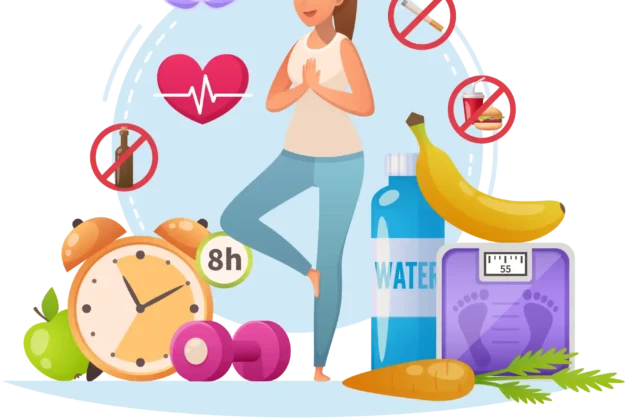Looking to improve your health without overhauling your entire life? You don’t need a massive diet change or a grueling exercise routine to start feeling better. Sometimes, the smallest changes can have the biggest impact on your well-being. In this article, we’ll explore simple and sustainable lifestyle tweaks that can help you live a healthier, happier life—without stressing about perfection. Let’s get started on your wellness journey, one easy step at a time.
Table of Contents
Introduction
When it comes to leading a healthy lifestyle, you don’t need to make sweeping changes all at once. In fact, some of the most effective health improvements come from small, manageable tweaks to your daily routine. Whether it’s making time for more movement, adjusting your diet just a little, or prioritizing your mental well-being, tiny changes can make a huge difference over time.
And let’s be real—living healthy doesn’t have to be a punishment. You don’t need to suddenly turn into a kale-obsessed yoga guru or wake up at 5 AM for a pre-work spin class (unless that’s your thing, of course!). By making some simple, sustainable adjustments, you’ll be amazed at how much better you feel.
Let’s dive into these simple lifestyle changes that will make you feel healthier and more energized without all the overwhelm.
1. Start Small, But Start Somewhere
The biggest mistake most people make when trying to live a healthier life is going all in too fast. Sure, you’re pumped to start a new health journey, but trying to overhaul your diet, start a new exercise routine, and change your sleep schedule all in one go is a recipe for burnout.
Tip: Instead of trying to do everything at once, start with one small change. Maybe it’s drinking an extra glass of water each day or adding a 10-minute walk after dinner. Gradually build on those changes as you gain momentum.
Pro Tip: Celebrate the small wins! You might not be running marathons yet, but did you remember to drink more water today? Go you! 🎉
2. Prioritize Sleep (Yes, Really!)
Sleep isn’t just for the tired—it’s the foundation of good health. Lack of sleep can affect everything from your mood and memory to your immune system and metabolism. When you’re well-rested, you’re more likely to make healthier choices throughout the day, whether it’s eating better or feeling motivated to exercise.
Tip: Set a consistent bedtime, even on weekends. Aim for 7-9 hours of sleep per night. And avoid scrolling on your phone before bed. Trust me, your mind will thank you.
3. Hydrate, Hydrate, Hydrate
You’ve heard it a thousand times, but water is the most underrated health tool in your life. Staying hydrated supports digestion, skin health, energy levels, and even your mood. If you’re feeling sluggish or hungry, sometimes all you need is a glass of water.
Tip: Carry a water bottle with you wherever you go. It’s like a personal hydration assistant. Aim to drink about 8 cups (64 oz.) a day, but more if you’re exercising or in hot weather.
Pro Tip: If plain water feels too boring, add a slice of lemon or cucumber for some flavor—fancy, right?
4. Move Your Body Daily (Without the Pressure)
Exercise doesn’t have to mean hitting the gym for an hour every day or training for a marathon. The key is finding movement you enjoy and making it a daily habit. Whether it’s dancing in your living room, walking to the corner store, or taking the stairs instead of the elevator, every little bit counts.
Tip: Start by walking for 15-20 minutes a day. It’s low-impact, great for your heart, and doesn’t require any fancy gym membership. Gradually build up your movement as you feel more comfortable.
5. Eat Mindfully, Not Perfectly
When it comes to eating healthy, you don’t need to stress over every bite. Mindful eating is all about being present with your food—enjoying the flavors, noticing when you’re full, and appreciating the nutrition you’re giving your body.
Tip: Slow down during meals, savor your food, and stop eating when you’re satisfied, not stuffed. This helps with digestion and can prevent overeating. No more scarfing down a sandwich while binge-watching Netflix.
Pro Tip: If you eat out often, try choosing healthier options, like a salad with dressing on the side or grilled instead of fried dishes.
6. Cut Back on Sugar (But Don’t Be Too Hard on Yourself)
We all know that sugar is a health villain, but let’s be real—completely eliminating it from your life can feel like an impossible mission. Instead of trying to cut it out entirely, start by reducing your intake. Cutting back on sugary drinks, processed snacks, and desserts can help you feel better and prevent energy crashes.
Tip: Swap sugary drinks for flavored water or herbal teas. If you have a sweet tooth, try satisfying it with fruit or a small piece of dark chocolate.
7. Take Breaks for Mental Health
It’s easy to get wrapped up in daily tasks, work stress, and the never-ending to-do list. But your mental health needs rest and reflection just as much as your physical body does. Breaks allow you to recharge, reduce stress, and maintain focus.
Tip: Step away from your screen for 5-10 minutes every hour. Stretch, breathe deeply, or simply stare out the window. Even a short break can help clear your mind.
Pro Tip: Try gratitude journaling—write down three things you’re grateful for every day. It’s a quick way to boost your mood and perspective.
8. Practice Healthy Relationships
It’s not all about what you put in your body—what you surround yourself with matters too. Healthy relationships with family, friends, and even yourself can have a profound impact on your overall well-being. Positive connections reduce stress and help you maintain a healthy mindset.
Tip: Make time for people who lift you up and try to distance yourself from negativity when possible. Even texting a friend or scheduling a coffee date can boost your mood and your health.
9. Get Some Sun (Safely!)
Vitamin D is vital for bone health, immune function, and mood regulation. The sun is a natural source, so spending a little time outdoors can give your body the boost it needs.
Tip: Aim for 15-20 minutes of sunlight each day—just be sure to wear sunscreen if you’ll be out for longer periods. Your skin will thank you!
10. Keep a Positive Attitude (It’s a Game Changer)
It’s easy to get caught up in negativity, but research shows that having a positive outlook can actually improve health outcomes. It reduces stress, lowers blood pressure, and can even improve heart health.
Tip: Start each day by thinking of one positive thing you’re grateful for or looking forward to. You might be surprised at how it shifts your mindset for the rest of the day.
Conclusion
Living a healthier life doesn’t require radical changes—it’s all about making simple, sustainable adjustments that work for you. Whether it’s drinking more water, getting enough sleep, or moving your body daily, small steps add up to big improvements over time.
Remember, it’s not about perfection; it’s about consistency. Start with a few easy changes, and you’ll begin to notice how much better you feel—physically, mentally, and emotionally. So, here’s to a healthier, happier you, one simple change at a time!
And hey, no need to be perfect—just be consistent. After all, as long as you’re moving forward, you’re doing great. 🎉
Read More: Understanding PCOS and Its Impact on the Menstrual Cycle: Causes, Symptoms, and Tips for Management





you are in reality a just right webmaster The site loading velocity is incredible It seems that you are doing any unique trick In addition The contents are masterwork you have performed a wonderful task on this topic
certainly like your website but you need to take a look at the spelling on quite a few of your posts Many of them are rife with spelling problems and I find it very troublesome to inform the reality nevertheless I will definitely come back again
Every time I visit your website, I’m greeted with thought-provoking content and impeccable writing. You truly have a gift for articulating complex ideas in a clear and engaging manner.
What i dont understood is in reality how youre now not really a lot more smartlyfavored than you might be now Youre very intelligent You understand therefore significantly in terms of this topic produced me personally believe it from a lot of numerous angles Its like women and men are not interested except it is one thing to accomplish with Woman gaga Your own stuffs outstanding Always care for it up
I’ve been following your blog for quite some time now, and I’m continually impressed by the quality of your content. Your ability to blend information with entertainment is truly commendable.
Uma leitura bem agradável e esclarecedora.
Thank you for the auspicious writeup It in fact was a amusement account it Look advanced to more added agreeable from you By the way how could we communicate
Wow wonderful blog layout How long have you been blogging for you make blogging look easy The overall look of your site is great as well as the content
Your blog is a breath of fresh air in the often mundane world of online content. Your unique perspective and engaging writing style never fail to leave a lasting impression. Thank you for sharing your insights with us.